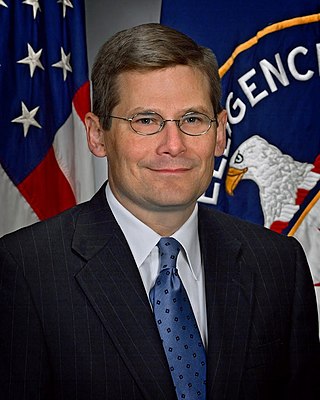
The Counterterrorism Division (CTD) is a division of the National Security Branch of the Federal Bureau of Investigation. CTD investigates terrorist threats inside the United States, provides information on terrorists outside the country, and tracks known terrorists worldwide. In the wake of the September 11 attacks in 2001, CTD's funding and manpower have significantly increased.

William Hedgcock Webster is an American attorney and jurist who most recently served as chair of the Homeland Security Advisory Council from 2005 until 2020. He was a United States district judge of the United States District Court for the Eastern District of Missouri and a United States circuit judge of the United States Court of Appeals for the Eighth Circuit before becoming director of the Federal Bureau of Investigation (FBI) from 1978 to 1987 and director of Central Intelligence (CIA) from 1987 to 1991. He is the only person to have held both positions.

In the United States, a Joint Terrorism Task Forces (JTTF) is a locally-based multi-agency partnership between various federal, state, and local law enforcement agencies tasked with investigating terrorism and terrorism-related crimes, led by the Federal Bureau of Investigation and U.S. Department of Justice. The first JTTFs were established before the September 11 attacks, with their numbers increasing dramatically in the years after.

Dale L. Watson is the former assistant director for the Counterterrorism Division of the FBI, as such he headed the FBI investigation into the September 11, 2001 attacks and the 2001 anthrax attacks.

Joseph Cofer Black is an American former CIA officer who served as director of the Counterterrorism Center in the years surrounding the September 11th attacks, and was later appointed Ambassador-at-Large and Coordinator for Counterterrorism at the State Department by President George W. Bush, serving until his resignation in 2004. Prior to his roles combatting terrorism, Black served across the globe in a variety of roles with the Directorate of Operations at the CIA.

The National Security Branch (NSB) is a service within the Federal Bureau of Investigation. The NSB is responsible for protecting the United States from weapons of mass destruction, acts of terrorism, and foreign intelligence operations and espionage. The NSB accomplishes its mission by investigating national security threats, providing information and analysis to other law enforcement agencies, and developing capabilities to keep the US nation secure.
Harry B. "Skip" Brandon founded Smith Brandon International, Inc. with Gene M. Smith in 1996. Smith Brandon International is a boutique corporate investigations and risk consulting firm based in Washington, D.C. Brandon is currently company COO. He is a former deputy assistant director of national security and counterterrorism for the Federal Bureau of Investigation. He retired from the FBI in 1993 after 23 years.

John Owen Brennan is a former American intelligence officer who served as the Director of the Central Intelligence Agency (CIA) from March 2013 to January 2017. He served as chief counterterrorism advisor to U.S. President Barack Obama, with the title Deputy National Security Advisor for Homeland Security and Counterterrorism, and Assistant to the President. Previously, he advised Obama on foreign policy and intelligence issues during the 2008 election campaign and presidential transition.

Michael Joseph Morell is an American former career intelligence analyst. He served as the deputy director of the Central Intelligence Agency from 2010 to 2013 and twice as its acting director, first in 2011 and then from 2012 to 2013. He also serves as a professor at the George Mason University - Schar School of Policy and Government.

The U.S. Central Intelligence Agency's Mission Center forCounterterrorism is a division of the CIA's Directorate of Operations, established in 1986. It was renamed during an agency restructuring in 2015, and is distinct from the National Counterterrorism Center (NCTC), which is a separate entity. The most recent publicly known Assistant Director for Counterterrorism Mission Center was Chris Wood who led the organization from 2015 to 2017.

After the Central Intelligence Agency lost its role as the coordinator of the entire Intelligence Community (IC), special coordinating structures were created by each president to fit his administrative style and the perceived level of threat from terrorists during his term.

The Counterintelligence Division (CD) is a division of the National Security Branch of the Federal Bureau of Investigation. The division protects the United States against foreign intelligence operations and espionage. It accomplishes its mission of hunting spies and preventing espionage through the use of investigation and interaction with local law enforcement and other members of the United States Intelligence Community. In the wake of the September 11, 2001 attacks, the division's funding and manpower have significantly increased.

The Intelligence Branch (IB) division of the Federal Bureau of Investigation (FBI) handles all intelligence functions, including information sharing policies and intelligence analysis for national security, homeland security, and law enforcement purposes. The IB operates through the use of embedded intelligence strategies.

The Cyber Division (CyD) is a Federal Bureau of Investigation division which heads the national effort to investigate and prosecute internet crimes, including "cyber based terrorism, espionage, computer intrusions, and major cyber fraud." This division of the FBI uses the information it gathers during investigation to inform the public of current trends in cyber crime. It focuses around three main priorities: computer intrusion, identity theft, and cyber fraud. It was created in 2002.

Sean M. Joyce was the 14th Deputy Director of the Federal Bureau of Investigation.

William R. Evanina is an American national security official who served as director of the United States National Counterintelligence and Security Center (NCSC) until his January 2021 resignation. As director of the NCSC he was the head of national counterintelligence for the U.S. Government. Evanina previously served as director of the Office of the national counterintelligence executive (ONCIX) before it transitioned into the NCSC. Prior to his service as national counterintelligence executive, he was the chief of the Counterespionage Group for the Central Intelligence Agency. He gained his initial law enforcement experience as a special agent for the Federal Bureau of Investigation.

Donald Trump's handling of United States government records, especially those containing classified information, during his tenure as the 45th U.S. president has come under scrutiny. A number of incidents in which the president disclosed classified information to foreign powers and private individuals have become publicly known, sometimes with distinct national security and diplomatic consequences.

Clint Watts is a senior fellow at the Center for Cyber and Homeland Security at George Washington University and a Foreign Policy Research Institute fellow. He previously was an infantry officer in the United States Army, and was the Executive Officer of the Combating Terrorism Center at United States Military Academy at West Point (CTC). He became a Special Agent for the Federal Bureau of Investigation where he served on the Joint Terrorism Task Force (JTTF). He has consulted for the FBI Counterterrorism Division (CTD) and FBI National Security Branch (NSB).

Josh Campbell is an American correspondent with CNN, former U.S. intelligence community official, and military veteran. He serves as an adjunct senior fellow and national security policy researcher with the Center for a New American Security.
Yael Eisenstat is vice president at the Anti-Defamation League, where she heads the Center for Technology and Society. A long-time democracy activist, she was most recently the Senior Advisor for Tech and Democracy at the Institute for Security and Technology and a Future of Democracy Fellow at the Berggruen Institute. She was a former Central Intelligence Agency officer, a National Security Advisor to former Vice President Joe Biden, and diplomat. In 2019–2020, she was a visiting fellow at Cornell Tech, focusing on technology's effects on democracy where she taught a course on tech, media and democracy. From 2017 to 2019, she was an adjunct assistant professor at the Center for Global Affairs at New York University. From June - November 2018, she was the Global Head of Elections Integrity Ops for political advertising at Facebook. She has become a vocal critic of the company since leaving. Currently, she specializes in ethics, technology and policy.


















